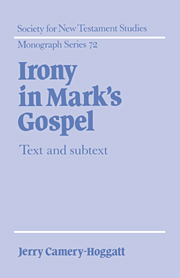Book contents
- Frontmatter
- Contents
- Preface
- List of abbreviations
- 1 Introduction: the problem of irony in Mark
- 2 The social functions of irony
- 3 The literary functions of narrative
- 4 Text and subtext: toward a rhetoric of irony
- 5 The Evidence of Irony in the Gospel of Mark
- 6 By way of summary
- Notes
- Bibliography
- Index
- CITATIONS FROM EXTRA-CANONICAL JEWISH LITERATURE
5 - The Evidence of Irony in the Gospel of Mark
Published online by Cambridge University Press: 22 October 2009
- Frontmatter
- Contents
- Preface
- List of abbreviations
- 1 Introduction: the problem of irony in Mark
- 2 The social functions of irony
- 3 The literary functions of narrative
- 4 Text and subtext: toward a rhetoric of irony
- 5 The Evidence of Irony in the Gospel of Mark
- 6 By way of summary
- Notes
- Bibliography
- Index
- CITATIONS FROM EXTRA-CANONICAL JEWISH LITERATURE
Summary
To you has been given the secret – the mystery – of the Kingdom of God, but to those outside everything is in riddles; so that they may indeed see but not perceive, and may indeed hear but not understand; lest they should turn again and be forgiven.
Mark 4.11 – 12In more than one sense the project in which we are engaged meets its most critical challenges in this chapter. Here we shall present a thoroughgoing reading of Mark's Gospel, pointing out and elaborating the ironies which appear along the way. But Mark is massive, and any interpreter who attempts to explore its details or its strategies of composition exhaustively is bound to suffer the fate of Sisyphus. One can live out one's days on an inexhaustible mountain of tedium. At the same time we shall want to engage in dialogue with those scholars whose views in one way or another impinge upon that reading, and to answer in our discussion the challenges they may raise. If the Gospel of Mark is massive, the literature which treats it is more so. The scholarship on Mark is enormous. It is enormous, but it is not monolithic, and one can take little comfort in the fact that it is riddled with cracks and fissures. Would Sisyphus have welcomed an end to his tedium if it came at the bottom of an avalanche?
The sheer volume of material requires that we take steps to keep our focus narrow.
- Type
- Chapter
- Information
- Irony in Mark's GospelText and Subtext, pp. 90 - 177Publisher: Cambridge University PressPrint publication year: 1992



